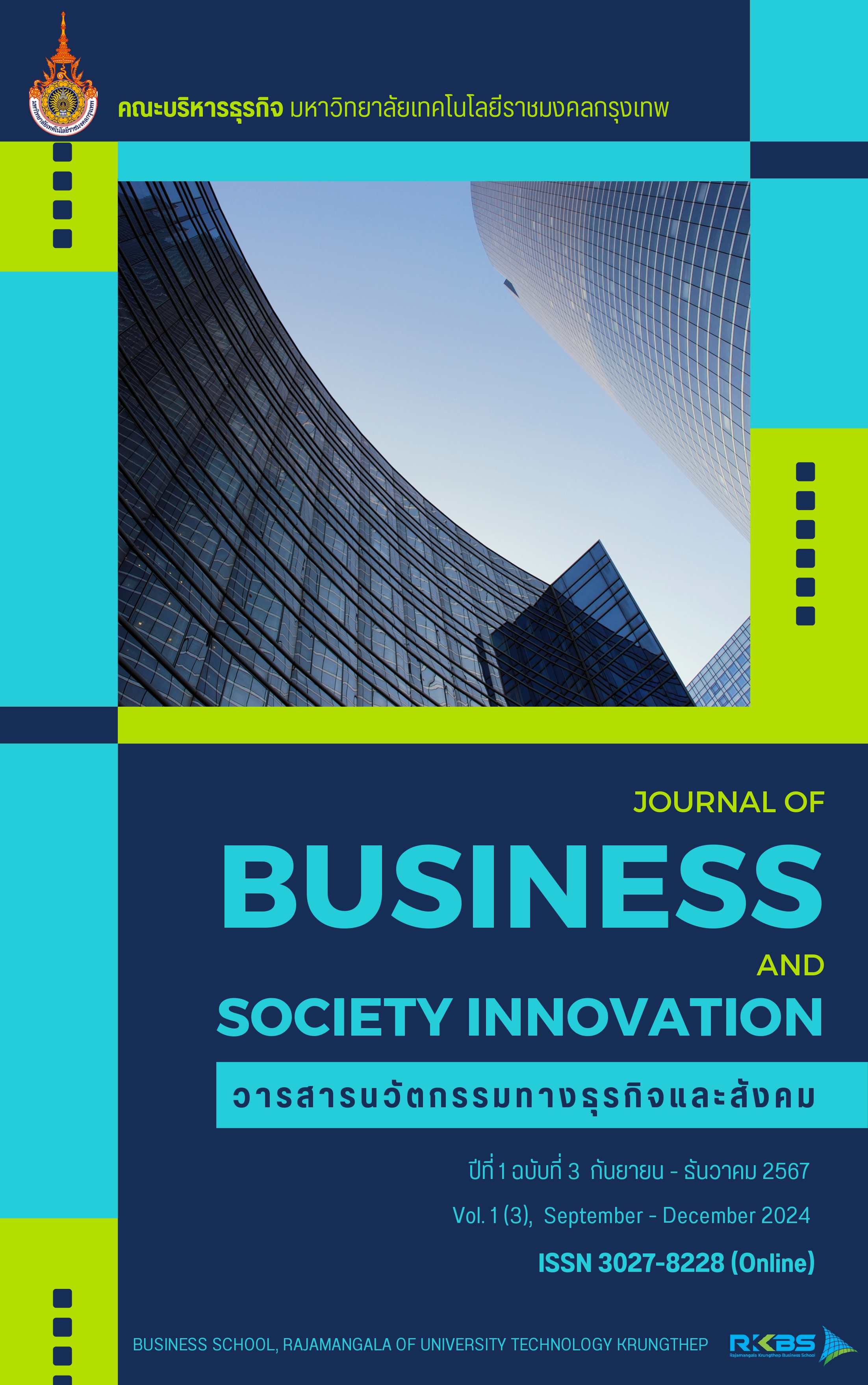การพยากรณ์เพื่อการสั่งซื้อวัตถุดิบอาหารสด และแนวทางในการคัดเลือก Supplier รายใหม่ กรณีศึกษาธุรกิจร้านอาหารบ้านกลางน้ำ
คำสำคัญ:
การพยากรณ์ การคัดเลือกผู้จำหน่าย การจัดซื้อบทคัดย่อ
การศึกษาค้นคว้าครั้งนี้มีวัตถุประสงค์ในการลดปัญหาวัตถุดิบหมดระหว่างการให้บริการ ซึ่งทำให้เกิดต้นทุนค่าเสียโอกาสในการขาย และเพื่อเป็นแนวทางในการคัดเลือก Supplier รายใหม่ เนื่องจากการสำรวจข้อมูลในการขาย พบว่าบริษัทมีค่าเสียโอกาสในการขายจากปัญหาการสั่งซื้อวัตถุดิบไม่เพียงพอ เมื่อทำการวิเคราะห์สาเหตุของปัญหาพบว่าเกิดจากหลายสาเหตุ ได้แก่ 1) การไม่ทราบความต้องการขายที่แท้จริง 2) การเปลี่ยนแปลงของพฤติกรรมผู้บริโภคในการเลือกรับประทานอาหาร 3) Supplier ไม่มีวัตถุดิบในการจัดส่ง 4) บริษัทฯ มีจำนวน Supplier ในการสั่งซื้อในแต่ละวัตถุดิบน้อยราย ผู้ศึกษาจึงเลือกใช้เครื่องมือ คือ วิธีการพยากรณ์ (Forecasting) เข้ามาช่วยทำการพยากรณ์ยอดขาย เพื่อช่วยในการตัดสินใจสั่งซื้อวัตถุดิบ โดยผู้ศึกษาทำการเก็บข้อมูลในการขายระยะเวลา 10 เดือน พบว่าวัตถุดิบที่มีค่าเสียโอกาสในการสั่งซื้อสูงที่สุด คือ กุ้งแม่น้ำ จึงเลือกวัตถุดิบนี้มาใช้ทำการพยากรณ์ โดยการทำการพยากรณ์จะใช้ 6 วิธีการพยากรณ์ เปรียบเทียบกันจากความผิดพลาด จากการเปรียบเทียบพบว่า วิธี Time Series Decomposition มีค่าต่ำทีสุด จึงเลือกใช้วิธีนี้การทำการพยากรณ์ยอดขายและสั่งซื้อวัตถุดิบ ซึ่งจากการสั่งซื้อวัตถุดิบตามค่าการพยากรณ์ทำให้สามารถลดค่าเสียโอกาสจากการขายได้จริง แต่หลังการปรับปรุงพบว่ายังคงเกิดปัญหาการเสียโอกาสในการขาย ผู้ศึกษาจึงปรับรอบการเช็ค Stock วัตถุดิบเพิ่มเป็น 2 รอบต่อวัน และทำการจัดหา Supplier รายใหม่เพื่อเป็นทางเลือกในการสั่งซื้อวัตถุดิบโดยใช้ AHP Analysis เข้ามาใช้ในการคัดเลือก Supplier ตั้งแต่การกำหนดค่าน้ำหนักของเกณฑ์ในการคัดเลือก และการทำการคัดเลือก Supplier แบบรายคู่ เพื่อหา Supplier ที่เหมาะสมในการสั่งซื้อวัตถุดิบ
เอกสารอ้างอิง
กันต์ธมน สุขกระจ่าง และธราธร กูลภัทรนิรันดร์. (2554). การวิเคราะห์ปัจจัยที่มีอิทธิพลต่อการตัดสินใจในการเลือกใช้ผู้ให้บริการขนส่งของกลุ่มผู้ส่งออกผลิตภัณฑ์แปรรูปสัตว์น้ำ โดยวิธี AHP”การประชุมวิชาการข่ายงานวิศวกรรมอุตสาหการ ประจำปี 2554. มหาวิทยาลัยเทคโนโลยีราชมงคลธัญบุรี.กรุงเทพฯ.
จิราพร ภู่ทองคา และถิรนันท์ ทิวาราตรีวิทย์. (2564) การพยากรณ์ความต้องการของวัตถุดิบเพื่อลดการเสียโอกาสทางการขาย กรณีศึกษา ร้าน Pizza HUK T&J
บริษัท เน็กซ์เทค ประเทศไทย จำกัด. (2560) ทำร้านอาหารให้รวยอย่างมืออาชีพ เข้าถึงได้จาก SMEs ชี้ช่องรวย 2015 http://www.easybiznezz.com/view_news.php?newsmedia_id=429
ฝนทิพย์ ฆารไสวและคณะ. (2555). การศึกษาคุณลักษณะของผู้ประกอบการที่ประสบความสำเร็จของธุรกิจโรงแรมในจังหวัดภาคเหนือตอนล่างของไทย วารสารวิทยาการจัดการและสารสนเทศศาสตร์ มหาวิทยาลัยนเรศวร
ชลธิชา เชื้อศิริ. (2558). การพยากรณ์ยอดขายของสินค้าผักสดและการบริหารชั้นวางสินค้า ณ ร้านโครงการหลวง สาขาตลาดบองมาเช่
วารสารบริหารธุรกิจ มหาวิทยาลัยธรรมศาสตร์. (2558). การคัดเลือกผู้ให้บริการโลจิสติกส์ของ บริษัท ฮานาไมโคร อิเล็คโทรนิกส์ จำกัด (มหาชน) โดยใช้กระบวนการตัดสินใจแบบการวิเคราะห์ลำดับชั้น(AHP) คณะพาณิชยศาสตร์และการบัญชี มหาวิทยาลัยธรรมศาสตร์.ศูนย์วิจัยเศรษฐกิจ ธุรกิจและเศรษฐกิจฐานราก
ธนาคารออมสิน. (2562) อุตสาหกรรมอาหาร และเครื่องดื่มปี 2562. กรุงเทพมหานคร : ธนาคารออมสิน.
สุรัสวดี สว่างแจ้ง. (2552) การประยุกต์ใช้กระบวกการลำดับชั้นเชิงวิเคราะห์สำหรับการประเมินด้านการจัดการโลจิสติกส์เชิงโซ่อุปทาน : กรณีศึกษาอุตสาหกรรมแปรรูปกุ้ง.สาขาการจัดการโซ่อุปทานแบบบูรณาการวิทยาศาสตรมหาบัณฑิต บัณฑิต บัณฑิตวิทยาลัย มหาวิทยาลัยธุรกิจบัณฑิตย์
สุรัตน์ ลีลาทวีวัฒน์. (2560) เจาะพฤติกรรมลูกค้า ใช้บริการร้านอาหาร เข้าถึงได้จาก https://www.prachachat.net/finance/news-16631.
ดาวน์โหลด
เผยแพร่แล้ว
รูปแบบการอ้างอิง
ฉบับ
ประเภทบทความ
สัญญาอนุญาต
ลิขสิทธิ์ (c) 2024 วารสารนวัตกรรมทางธุรกิจและสังคม

อนุญาตภายใต้เงื่อนไข Creative Commons Attribution-NonCommercial-NoDerivatives 4.0 International License.


